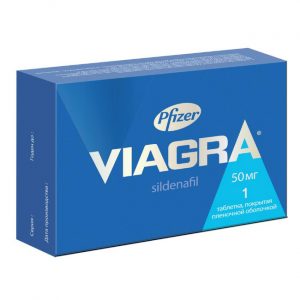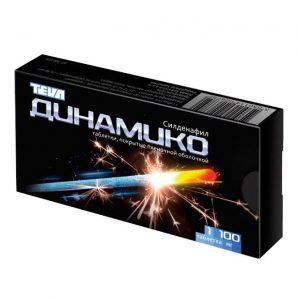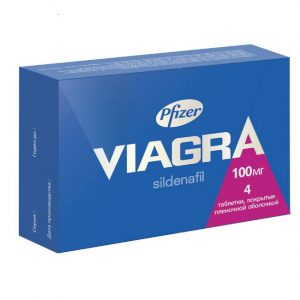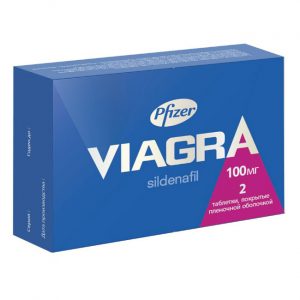Description
Release form
Tablets.
Packing
1 pc.
Pharmacological action of
Sildenafil is a potent selective inhibitor of type 5 cGMP-specific phosphodiesterase (PDE-5). The implementation of the physiological mechanism of erection is associated with the release of nitric oxide (NO) in the cavernous body during sexual stimulation. This in turn leads to an increase in cGMP levels, subsequent relaxation of the smooth muscle tissue of the cavernous body and an increase in blood flow.
Sildenafil does not have a direct relaxing effect on an isolated human cavernous body, but enhances the effect of nitric oxide (NO) by inhibiting PDE5, which is responsible for the breakdown of cGMP.
Sildenafil is selective against PDE-5 in vitro, its activity against PDE-5 is superior to activity against other known phosphodiesterase isoenzymes: PDE-6 – 10 times PDE-1 – more than 80 times PDE-2, PDE-4, PDE-7 PDE-11 – more than 700 times. Sildenafil is 4,000 times more selective for PDE-5 compared to PDE-3, which is crucial because PDE-3 is one of the key enzymes in the regulation of myocardial contractility.
A prerequisite for the effectiveness of sildenafil is sexual stimulation.
The use of sildenafil in doses up to 100 mg did not lead to clinically significant ECG changes in healthy volunteers. The maximum decrease in SBP in the supine position after taking sildenafil at a dose of 100 mg was 8.3 mm RT. Art. and dad – 5.3 mm RT. Art. A more pronounced, but also transient effect on blood pressure was observed in patients taking nitrates.
In some patients, 1 h after taking sildenafil at a dose of 100 mg using the Farnsworth-Munsel 100 test, a mild and transient impairment in the ability to distinguish shades of color (blue / green) was detected. 2 hours after taking the drug, these changes were absent. It is believed that color vision impairment is caused by the inhibition of PDE-6, which is involved in the process of light transmission in the retina. Sildenafil does not affect visual acuity, contrast perception, electroretinogram, intraocular pressure or pupil diameter.
Contraindications
– concomitant use of nitric oxide donors (e.g. amyl nitrite), organic nitrates or nitrites in any form of
– use in patients for whom sexual activity is undesirable (e.g. with severe cardiovascular diseases such as unstable angina, severe heart failure, arterial hypotension (blood pressure 90/50 mm Hg ))
– recently suffered cerebrovascular accident or myocardial infarction
– hereditary degenerative diseases of the retina, incl. retinitis pigmentosa (a smaller proportion of these patients have a genetic disorder of retinal phosphodiesterase)
– severe liver failure
– simultaneous administration of ritonavir
– simultaneous administration of other drugs for the treatment of erectile dysfunction
– use of the drug in women
– up to 18 years of age – srdlk sensitivity to sildenafil or to any other component of the drug.
Caution should be used in patients with arterial hypertension (BP> 170/100 mmHg) with life-threatening arrhythmias, obstructive diseases of the excretory part of the left ventricle of the heart (aortic stenosis, hypertrophic obstructive cardiomyopathy) by anatomical deformation of the penis (angulation, cavernous fibrosis or Peyronie’s disease) loss of vision in one eye as a result of non-arterial anterior ischemic optic neuropathy with diseases predisposing to the development of priapism (sickle cell anemia, multiple myeloma, leukemia, leukemia, accompanied by bleeding with peptic ulcer in the acute stage, while taking alpha-blockers.
Special instructions
To diagnose erectile dysfunction, determine their possible causes and choose an adequate treatment, you need to collect a complete medical history and conduct a thorough physical examination.
Sexual activity poses a certain risk in the presence of heart disease, therefore, before starting any therapy for erectile dysfunction, the doctor should refer the patient to an examination of the state of the cardiovascular system. The use of sildenafil is contraindicated in patients with heart failure, unstable angina, suffered in the past 6 months, myocardial infarction or stroke, hypotension (blood pressure <90/50 mm Hg). Sildenafil has a systemic vasodilating effect, leading to a transient decrease in blood pressure, which is not a clinically significant phenomenon and does not lead to any consequences in most patients. However, before prescribing Tornetis ®, the doctor must carefully assess the risk of possible undesirable manifestations of vasodilating effects in patients with relevant diseases, especially against the background of sexual activity. Increased susceptibility to vasodilators is observed in patients with obstruction of the exit tract of the left ventricle of the heart (aortic stenosis, hypertrophic obstructive cardiomyopathy), as well as with rare syndrome of multiple systemic atrophy, which manifests itself as a severe violation of the regulation of blood pressure by the autonomic nervous system. Since the combined use of sildenafil and alpha-blockers can lead to symptomatic hypotension in some sensitive patients, sildenafil should be used with caution in patients taking alpha-blockers. To minimize the risk of postural hypotension in patients taking alpha-blockers, sildenafil should only be started after hemodynamic stabilization is achieved in these patients. Consideration should be given to reducing the initial dose of sildenafil. In addition, the doctor should inform patients about what actions should be taken in case of symptoms of postural hypotension. Sildenafil enhances the antiaggregation effect of sodium nitroprusside (nitric oxide donor) on human platelets in vitro. There is no information on the safety of sildenafil in patients with internal bleeding or an active peptic ulcer of the stomach, so it should be used with caution. In some post-marketing and clinical studies using all PDE5 inhibitors, including sildenafil, a sudden decrease or loss of hearing was reported in patients. However, in most cases, these patients had risk factors for the development of this pathology, and no correlation was found between the use of PDE5 inhibitors and a sudden decrease or loss of hearing. The patient should be warned that in the event of a sudden decrease or loss of hearing, it is necessary to discontinue sildenafil therapy and consult a doctor immediately. The safety and effectiveness of sildenafil in conjunction with other treatments for erectile dysfunction have not been studied, so the use of such combinations is not recommended. Special precautions when disposing of an unused drug No special precautions are required when disposing of an unused drug. Influence on the ability to drive vehicles and control mechanisms There is no evidence of a negative effect of Tornetis in recommended doses on the ability to drive a car or work with mechanisms. However, since when taking the drug, a decrease in blood pressure, the development of chromatopsy, blurred vision, it is necessary to carefully consider the individual effect of the drug in these situations, especially at the beginning of treatment and when changing the dosage regimen. Composition active substance: sildenafil citrate 140. 4 mg, which corresponds to the content of sildenafil 100 mg Dosage and administration of Inside, approximately 1 hour before the planned sexual activity. A single dose for adults is 50 mg 1 time / day. Given the effectiveness and tolerability, the dose can be increased to 100 mg or reduced to 25 mg. The maximum single dose is 100 mg 1 time / day. In patients with severe renal failure (CC less than 30 ml / min), it is recommended to reduce the dose of Tornetis to 25 mg. Since in patients with liver failure, the excretion of sildenafil is reduced, the recommended dose of Tornetis is 25 mg. Dosage adjustment of the drug Tornetis in elderly patients is not required. When used together with inhibitors of the CYP3A4 isoenzyme (erythromycin, saquinavir, ketoconazole, itraconazole), the initial dose of Tornetis should be 25 mg. To minimize the risk of developing postural hypotension in patients taking alpha-blockers, Tornetis should be started only after the stabilization of hemodynamics in these patients is achieved. The feasibility of lowering the initial dose of Tornetis should be considered. Side effects of the From the nervous system: very often – headache often – dizziness infrequently – drowsiness, hypesthesia rarely – stroke, fainting frequency is unknown – transient ischemic attack, convulsions, incl. recurrent. From the cardiovascular system: often – hot flashes infrequently – palpitations, tachycardia rarely – increase or decrease in blood pressure, myocardial infarction, atrial fibrillation, frequency unknown – ventricular arrhythmia, unstable angina, sudden death. From the side of the organ of vision: often – visual impairment, violation of color perception infrequently – conjunctival damage, violation of lacrimation, frequency is unknown – anterior ischemic optic neuropathy, retinal vascular occlusion, visual field defects. On the part of the hearing organ: infrequently – vertigo, tinnitus rarely – deafness. On the part of the respiratory system: often – nasal congestion rarely – nosebleeds. From the gastrointestinal tract: often – dyspepsia infrequently – vomiting, nausea, dryness of the oral mucosa. Allergic reactions: infrequently – skin rash frequency is unknown – Stevens-Johnson syndrome, toxic epidermal necrolysis (Lyell’s syndrome). From the genital organs: frequency is unknown – priapism, prolonged erection. Other: rarely – chest pain, fatigue. Drug interactions The influence of other drugs on the metabolism of sildenafil Metabolism of sildenafil occurs mainly in the liver under the action of isoenzymes CYP3A4 (the main pathway) and CYP2C9, therefore, inhibitors of these isoenzymes can reduce the clearance of sildenafil, and inducers of sildenafil and . With the simultaneous use of CYP3A4 inhibitors (such as ketoconazole, erythromycin, cimetidine), a decrease in the clearance of sildenafil was noted. Cimetidine (800 mg), which is a non-specific inhibitor of CYP3A4, while taking sildenafil (50 mg) causes an increase in the concentration of sildenafil in plasma by 56%. A single dose of 100 mg sildenafil simultaneously with erythromycin, a specific inhibitor of CYP3A4 (when taking erythromycin 2 times / day, 500 mg for 5 days), against the background of achieving a constant level of erythromycin in the blood, leads to an increase in AUC of sildenafil by 182%. With the simultaneous use of sildenafil (once in a dose of 100 mg) and saquinavir, which is both an HIV protease inhibitor and an inhibitor of CYP3A4 (when taking saquinavir 3 times / day at a dose of 1200 mg), while achieving a constant level of saquinavir in the blood, Cmax blood sildenafil increased by 140%, and AUC increased by 210%. Sildenafil does not affect the pharmacokinetic parameters of saquinavir. More potent inhibitors of the CYP3A4 isoenzyme, such as ketoconazole or itraconazole, can cause more pronounced changes in the pharmacokinetics of sildenafil. The simultaneous use of sildenafil (once at a dose of 100 mg) and ritonavir, which is an HIV protease inhibitor and a powerful inhibitor of isoenzymes of the P450 cytochrome system (when taking ritonavir 500 mg 2 times / day), while achieving a constant level of ritonavir in the blood, Cmax sildenafil increased by 300% (4 times), and AUC by 1000% (11 times). After 24 h, the concentration of sildenafil in the blood plasma was approximately 200 ng / ml (with a single use of one sildenafil – 5 ng / ml). Grapefruit juice, a weak inhibitor of CYP3A4, can moderately increase plasma concentrations of sildenafil. A single dose of antacid (magnesium hydroxide / aluminum hydroxide) does not affect the bioavailability of sildenafil. CYP2C9 inhibitors (such as tolbutamide, warfarin), CYP2D6 (such as selective serotonin reuptake inhibitors, tricyclic antidepressants), thiazides and thiazide-like diuretics, ACE inhibitors and calcium antagonists do not affect the pharmacokinetic parameters. Concomitant use of azithromycin (500 mg / day for 3 days) does not affect AUC, Cmax, Tmax, excretion rate constant and T1 / 2 of sildenafil or its main circulating metabolite. Nicorandil is a hybrid of nitrate and potassium channel activator. Due to the presence of a nitrate component, it can enter into serious interactions with sildenafil. Effect of sildenafil on other drugs Sildenafil is a weak inhibitor of isoenzymes of the P450 cytochrome system – 1A2, 2C9, 2C19, 2D6, 2E1 and 3A4 (IC50> 150 μM).
It is unlikely that sildenafil can affect the clearance of substrates of these isoenzymes.
Sildenafil enhances the hypotensive effect of nitrates, both with prolonged use, and with acute indications. In this regard, the use of sildenafil in combination with nitrates or nitric oxide donors is contraindicated.
With the simultaneous administration of the alpha-blocker doxazosin (4 mg and 8 mg) and sildenafil (25 mg, 50 mg and 100 mg) in patients with benign prostatic hyperplasia with stable hemodynamics, the average additional decrease in systolic / diastolic blood pressure in the supine position was 7/7 mmHg, 9/5 mmHg and 8/4 mm Hg, respectively, and in the standing position – 6/6 mm Hg, 11/4 mm Hg and 4/5 mm Hg, respectively. Rare cases of the development of symptomatic postural hypotension in such patients, manifested in the form of dizziness (without fainting), have been reported. In some sensitive patients receiving alpha-blockers, the simultaneous use of sildenafil can lead to symptomatic hypotension.
There was no evidence of a significant interaction of sildenafil (50 mg) with tolbutamide (250 mg) or warfarin (40 mg), which are metabolized by CYP2C9.
Sildenafil at a dose of 100 mg does not affect the pharmacokinetic parameters of HIV protease inhibitors at their constant concentration in the blood, such as saquinavir and ritonavir, which are simultaneously substrates of CYP3A4.
Sildenafil (50 mg) does not cause an additional increase in bleeding time when taking acetylsalicylic acid (150 mg). Sildenafil (50 mg) does not enhance the hypotensive effect of ethanol in healthy volunteers with a maximum blood ethanol level of an average of 80 mg / dl.
In patients with hypertension, no signs of interaction of sildenafil (100 mg) with amlodipine were detected. The average additional decrease in blood pressure in the supine position is: systolic – by 8 mm Hg, diastolic – by 7 mm Hg.
The use of sildenafil in combination with antihypertensive agents does not lead to additional side effects.
Overdose
Symptoms: headache, flushing of the face, dizziness, dyspepsia, nasal congestion, visual impairment.
In studies in healthy volunteers with a single dose of the drug in doses up to 800 mg, adverse events were comparable to those with sildenafil at lower doses, but were more common.
Treatment: in case of an overdose, standard symptomatic measures must be taken. Dialysis does not accelerate the elimination of the drug, since sildenafil is firmly bound to plasma proteins and is not excreted in the urine.
Storage conditions
The product should be stored out of the reach of children at a temperature not exceeding 25 ° C.
Expiration
2 years.
Active ingredient
Sildenafil
Terms leave through pharmacies
In retseptu
PMA pills
Sandoz, Switzerland




